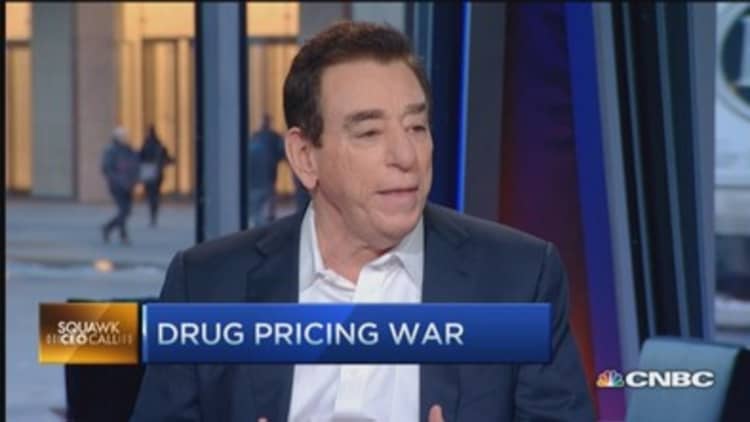
Spending on specialty medicines took a record rise in the U.S. last year, driven primarily by new drugs for hepatitis C, according to pharmacy benefits manager Express Scripts, which has been waging a war against the therapies' costs.
Total prescription drug spending rose 13 percent in 2014, the biggest increase since 2003, Express Scripts said in a report Tuesday. Spending on specialty medicines, such as those for inflammatory diseases, multiple sclerosis and cancer—as well as hepatitis C—rose an unprecedented 31 percent.
Express Scripts, the largest pharmacy benefits manager in the U.S., has been at the forefront of a campaign against high drug prices for hepatitis C treatments such as Gilead Sciences' Sovaldi, which costs about $1,000 per day, or $84,000 for a 12-week course of treatment. In December, Express Scripts made a deal with Gilead's competitor, AbbVie, to exclusively offer its drug on its largest plan, sending Gilead's shares plummeting.
That move ignited a price war that culminated in early February, when Gilead shocked investors by announcing expected discounts of 46 percent on its hepatitis C drugs, Sovaldi and Harvoni, for 2015.
"The reality is, these are great new drugs that are coming to the market," Express Scripts Chief Medical Officer Steve Miller said in a Tuesday interview on CNBC's "Squawk Box." "The trouble is it's just not sustainable pricing. And so we have to do something to both bring the products to the marketplace, but also make it affordable for patients."
Read MoreFighting mosquitoes with more mosquitoes
Spending on hepatitis C drugs, driven primarily by Gilead's medicines, rose 743 percent last year, Express Scripts said. It forecast an increase of 67 percent in spending on that category this year, due to pricing-control strategies such as the one with AbbVie. The medicines mark a tremendous advance in the treatment of hepatitis C, curing most patients with drugs taken orally and with fewer side effects than older therapies that required injections.
Express Scripts has now turned its focus to other classes of medicines, sending shudders through the drug industry. The next class to feel the pressure may be new cholesterol medicines being developed by Amgen, Regeneron and Sanofi, expected to be approved by the Food and Drug Administration later this year.
Read MoreNew look at contraception rule
Known as PCSK9 inhibitors, the new drugs may be prescribed to patients who need help beyond statins like Lipitor in lowering their cholesterol. Express Scripts warns the new drugs may cost as much as $10,000 a year and ultimately be prescribed to as many as 10 million Americans, amounting to a $100 billion cost to the U.S. health-care system annually. CVS has put the cost even higher, at $150 billion.
Regeneron Chief Executive Len Schleifer, in a February interview on CNBC's "Squawk Box," disagreed.
"It's wrong," Schleifer said. "I can tell you that it's not going to be $150 billion a year. That's a little bit of, I would say, gamesmanship, because they're trying to obviously come and get the discussion going with a little bit of fear to the system that it's going to overwhelm the system. It's just not true."
Regeneron and partner Sanofi will "come out with a fair price," he said. "It's not going to be used by all those millions of people."
Read MoreObamacare costs set to fall: CBO
Miller said Tuesday that Express Scripts is already engaging with makers of the cholesterol drugs, creating a different dynamic than seen for hepatitis C.

"We're going to push really hard because we've got to get the best price for our clients," Miller said. "But we think the reality for the PCSK9s is much different. We're having great conversations with Regeneron, Sanofi, Amgen... so we would really like for the right price to be the price they bring it to the market at."
It's a debate that continues to rage through the industry, with Express Scripts calling hepatitis C medicines "just one example of non-orphan drugs with orphan-drug price tags." Orphan drugs are those for small patient populations, which can usually command higher price tags to create a return on investment.
Express Scripts' National Preferred Formulary, its largest plan, excluded 48 products from coverage in 2014, and the PBM said those classes of drugs saw a 3.9 percent decrease in drug spending. Clients that didn't adopt that formulary plan saw an increase of 7.2 percent of spending on those therapeutic classes.
Express Scripts compiled the report based on its own pharmacy claims data; the pharmacy benefit manager says it manages more than a billion prescriptions annually for about 85 million patients. Unlike an annual report on drug spending from IMS Health, Express Scripts says its figures exclude drug rebates paid by companies to insurers.
CORRECTION: An earlier version misspelled Sovaldi.

